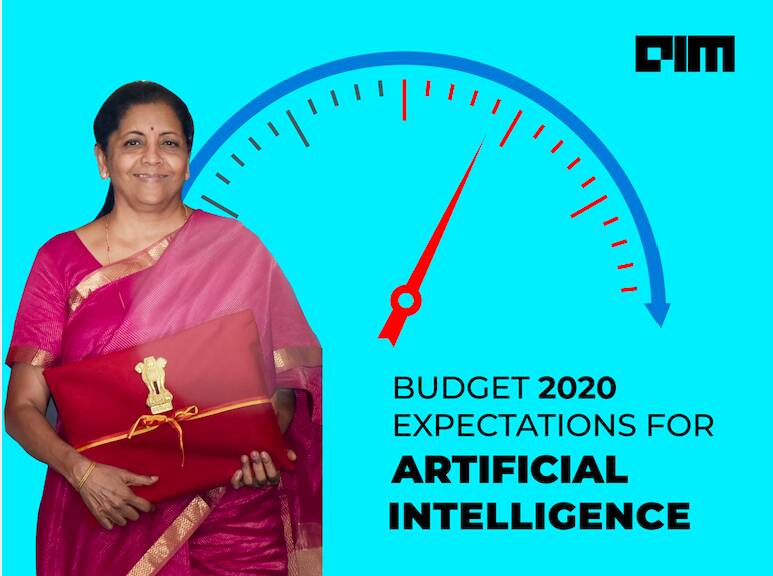The India budget 2020 should include a key emphasis on the implementation of the National Centre of AI as it will prepare organisations for better human-machine partnership and analyse consumer patterns using big data, say tech experts.
It’s time for India budget 2020, and the tech industry is keenly looking forward to the announcements that impact their industry. There is a lot on the shoulders of finance minister Nirmala Sitharaman, especially at a time when there has been a slowdown in the economy, and an apparent crunch is taking place in the technology sector. In this article, we take a look at what India’s tech leaders expect from the budget in terms of allocations to deep tech, particularly artificial intelligence AI.
While we saw last year that a national programme on AI had been envisioned by the government of India which was meant to be supported by the national centre for artificial intelligence as a hub, along with other centres of excellence, as earlier stated by Piyush Goyal.
While India has the opportunity to position itself among front runners on the global AI map with a unique strategy of ‘AI-for-All’, NITI Aayog has decided to focus on five sectors — healthcare, agriculture, education, smart cities and infrastructure, and intelligent mobility and transportation. It’s expected that the government would allocate substantial funds in this direction for the 2020 budget presentation.
“We are expecting that the government will initiate further investments in the National Centers for Artificial Intelligence and AI hubs that will help the startup ecosystem garner the benefits of these technologies,” said Kushal Nahata, CEO & Co-founder at FarEye.
The Indian AI market size in 2019 has broken out of the trend that we had seen the years before. And, this year, the overall market size witnessed a dramatic jump in terms of market growth, which is an excellent sign for the industry. The artificial intelligence (AI) and analytics industry in India is presently estimated to be $415 million annually in revenues in 2019, up from $230 million in 2018, according to a report by Analytics India Magazine. But, is there a further need to give a boost to the industry given the industry size is still not that large if we compare to the global market?
“Given how data and analytics are enabling organisations to bolster productivity through smarter, more effective work, the government must look to incentivise data analytics and AI projects as well as introduce technology-friendly policies and better tax structures for the industry,” says Suganthi Shivkumar, Managing Director, ASEAN, India & Korea at Qlik.
India Budget 2020: Allocating For The Global AI Race
One of the most significant areas where countries are competing for dominance is the artificial intelligence domain, which is expected to have a considerable impact not only in commerce but also in areas like healthcare, national security, cybersecurity, food security, education industry, etc. Unfortunately, countries like the USA and China are leaving India behind in terms of AI research, AI entrepreneurship and government investment in AI.
If you look at China, it has been steadily building an ecosystem to fuel its ambition to become a world leader in AI by 2030 and having the most prominent startups in artificial intelligence. China achieved this feat via a tremendous amount of budget allocations and investments in AI technology in China. India, however, has not announced any budget 2020 allocation for its AI plan.
“Taking a step closer to the Digital India initiative, the budget 2020 should include a key emphasis on the implementation of the National Centre of Artificial Intelligence as it will prepare organisations for better human-machine partnership and analyse consumer patterns using big data. Furthermore, building 1 lakh digital villages will open up an untapped marketplace for digital marketers to cater to consumer needs with bespoke services that were earlier consumed only in urban areas,” says Prasad Shejale, founder and CEO of Logicserve Digital.
India Budget 2020: Industry Expects Special Funds & Projects For Data Privacy
As India prepares for investing in artificial intelligence capabilities, it should, at the same time, lay work on creating personal data protection and privacy laws in place to avoid misuse of data of its citizens. 2019 saw multiple incidents of breach and privacy violations. According to experts, with the rampant growth of data and data analytics in India, privacy becomes paramount. This holds true, particularly for sectors like healthcare, where data privacy is incredibly sensitive.
“It is important to note that the amount of data being created and stored across industries continues to grow at unprecedented rates. The government, therefore, must also intervene and play a role in the protection & management of this data,” thinks Deepak Mittal, CEO & Co-founder, TO THE NEW.
Given the national data, privacy bill is soon to be implemented, and it makes sense there is a full-fledged need to revamp infrastructure to ensure compliance at all levels within the government along with support to the corporate sector.
“Despite the intention of the government to promote data privacy through proposals such as the Digital Information Security in Healthcare Act (DISHA), the reality on the ground is fraught with a lack of systems to collect, de-identify, store or control access for data. I hope that the budget will allocate funds to support data privacy initiatives as well,” states Zoya Brar, Founder and CEO, CORE Diagnostics.
AI Startups Program & Incentives Can Play A Tremendous Role In Catapulting India In The AI Race
Artificial intelligence is one of the crucial elements of digital empowerment, attention on both industry and public is needed for the hour. Experts and industry leaders say that from an industry perspective, the government should focus on budget 2020 for establishing specialised AI centres and R&D Labs to bring up more product companies and make India a global centre of innovation.
Further, leaders say there is a need to incentivisation and aid for startups in artificial intelligence which would help domestic companies to compete against foreign players originating from China.
According to Bhavin Turakhia, Founder and CEO of Flock says on budget expectations, “With tech disruption today being a catalyst for the growth of startups, we expect the government to make significant investments in technology hubs to help strengthen emerging technologies such as artificial intelligence, machine learning, and IoT.”
The government has addressed compliance procedures and regulatory bottlenecks concerning startups, which is expected to help the ecosystem in developing further core technologies like artificial intelligence.
Saurabh Saxena, Country Director – India, Micro Focus agrees and emphasises the importance of promoting startups in the deep tech industry. “Our country has 1600+ deep tech startups that are building innovative solutions. Additionally, deep tech-led by AI has the potential to add over USD 957 billion to India’s GDP by 2035, according to a recent report released by Nasscom.
As such, the ability of Indian companies to rapidly scale up continues to be India’s unique competitive advantage. To increase India’s R&D expenditure, there is a need for greater government support and policies that would incentivise R&D.
With proposals made on AIRAWAT and allocations made for AI strategy via NITI Aayog, it seems that the government has taken it seriously to allocate funds on boosting artificial intelligence in the country. The industry is expecting more such allocations towards infrastructure development for AI projects.
Will there be a distinction made between Digital India and specific AI-related expenditure or will AI come under the vague purview of Digital India initiatives as has been the case for several years? According to industry leaders, it is the time to look beyond the IT and outsourcing industry to boost India’s domestic deep tech capabilities.
Dr. Pulkit Mathur, CEO at Queppelin says on Budget, “Deep tech which includes Augmented Reality, Computer vision, Artificial Intelligence will play a big role across sectors in accelerating India’s quest towards becoming a $5tn economy. Driving greater value as well as job-creation will both be impacted by it. We, therefore, would like to see the FM incentivise this sector. Deep tech should be a special focus separate from the IT/ITeS SEZ sunset clause, which also should be extended beyond 2020.”



















































































